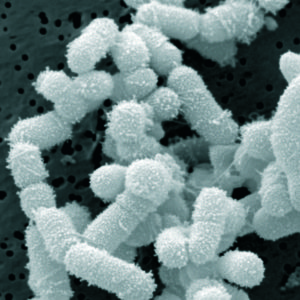 After writing about Lactobacillus sakei in the sinuses for several years (present in healthy sinuses, absent or less in those with chronic sinusitis, and also a treatment for chronic sinusitis), I wondered whether L. sakei is found anywhere else in the body. Today I read a study (conducted in Japan) about gut microbes and strokes and there it was - the presence of L. sakei in the gut.
After writing about Lactobacillus sakei in the sinuses for several years (present in healthy sinuses, absent or less in those with chronic sinusitis, and also a treatment for chronic sinusitis), I wondered whether L. sakei is found anywhere else in the body. Today I read a study (conducted in Japan) about gut microbes and strokes and there it was - the presence of L. sakei in the gut.
Specifically, a study found that people who have ischemic strokes tend to have lower amounts ("depletion") of L. sakei in the gut than healthy people, even though it was detected in 80% of both groups.
The study found that in people with ischemic strokes there was evidence for the gut microbes being out of whack (dysbiosis), as well as more inflammation, and more of certain bacteria species (Atopobium cluster and Lactobacillus ruminis), and depletion of L. sakei bacteria.
The researchers took samples of stool (fecal samples) from each person of both groups (ischemic stroke group and healthy group) and analyzed the stool with modern tests (genetic sequencing) to see whether 22 groups of bacteria were in it. (Note that there are normally hundreds of species of bacteria living in a healthy person's gut, as well as viruses, fungi, etc.).
So once again it looks like L. sakei may be beneficial bacteria, even in the gut. The researchers were careful to point out that they couldn't say that certain bacteria caused the strokes - just that there was an association.
And what diet is associated with lower levels of inflammation in the body? Once again - a diet with lots of fruits, vegetables, whole grains, nuts, seeds, and legumes (think Mediterranean style diet). You want to feed the beneficial bacteria in the gut.
Excerpts from a research article by Yamashiro et al in PLoS One: Gut dysbiosis is associated with metabolism and systemic inflammation in patients with ischemic stroke
The role of metabolic diseases in ischemic stroke has become a primary concern in both research and clinical practice. Increasing evidence suggests that dysbiosis is associated with metabolic diseases. The aim of this study was to investigate whether the gut microbiota, as well as concentrations of organic acids, the major products of dietary fiber fermentation by the gut microbiota, are altered in patients with ischemic stroke, and to examine the association between these changes and host metabolism and inflammation.
We analyzed the composition of the fecal gut microbiota and the concentrations of fecal organic acids in 41 ischemic stroke patients and 40 control subjects via 16S and 23S rRNA-targeted quantitative reverse transcription (qRT)-PCR and high-performance liquid chromatography analyses..... Although only the bacterial counts of Lactobacillus ruminis were significantly higher in stroke patients compared to controls, multivariable analysis showed that ischemic stroke was independently associated with increased bacterial counts of Atopobium cluster and Lactobacillus ruminis, and decreased numbers of Lactobacillus sakei subgroup, independent of age, hypertension, and type 2 diabetes....Together, our findings suggest that gut dysbiosis in patients with ischemic stroke is associated with host metabolism and inflammation.
Ischemic stroke is associated with metabolic diseases including obesity, type 2 diabetes (T2D), and dyslipidemia. Systemic low-grade inflammation is also closely linked to metabolic disorders and plays a substantial role in the pathogenesis of cardiovascular diseases, including ischemic stroke.....Increasing evidence suggests that dysbiosis of the gut microbiota is associated with the pathogenesis of both intestinal disorders, such as inflammatory bowel disease, and extra-intestinal disorders, including metabolic diseases.
In our study, the 22 bacterial groups/genera/species examined were comprised of (1) six anaerobes that predominate the human intestine (Clostridium coccoides group, Clostridium leptum subgroup, Bacteroides fragilis group, Bifidobacterium, Atopobium cluster, and Prevotella); (2) seven potential pathogens (Clostridium difficile, Clostridium perfringens, Enterobacteriaceae, Enterococcus spp., Streptococcus spp., Staphylococcus spp., and Pseudomonas spp.); and (3) nine lactobacilli (L. gasseri subgroup, L. brevis, L. casei subgroup, L. fermentum, L. fructivorans, L. plantarum subgroup, L. reuteri subgroup, L. ruminis subgroup, and L. sakei subgroup).
Although only the bacterial counts of L. ruminis were significantly higher in stroke patients compared to the controls.....Thus, increased L. ruminis subgroup counts might contribute to inflammation in stroke patients. Conversely, ischemic stroke was also associated with decreased counts of other Lactobacillus species such as the L. sakei subgroup. It was previously reported that L. sakei is associated with higher BMI in healthy adults and the elderly. Notably, a significant depletion of L. sakei was reported in the sinus mucosa of patients with chronic rhinosinusitis. These organisms were found to provide a protective effect against sinus mucosa infection through the competitive inhibition of pathogenic bacteria.... depletion of these bacteria might be deleterious to intestinal mucosal defense in patients with stroke.
